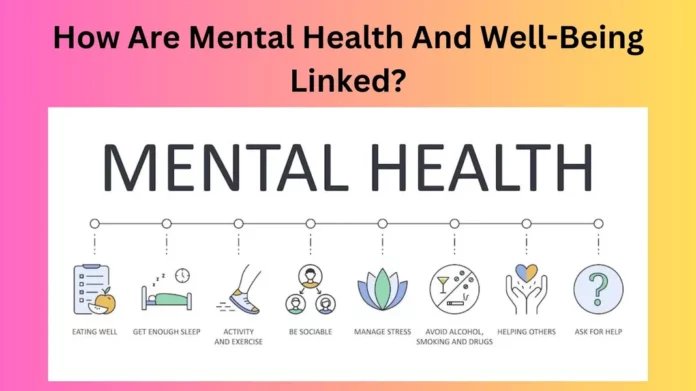Mental health and well-being are two integral aspects of our lives that are often closely intertwined. While they may seem like distinct concepts, they share a strong connection that significantly influences our overall quality of life.
In this article, we will explore the intricate relationship between mental health and well-being, shedding light on how they impact one another, and the steps we can take to promote a harmonious balance.
Unraveling Mental Health
Before we dive into the connection between mental health and well-being, it’s essential to grasp what mental health encompasses. Mental health refers to your emotional, psychological, and social well-being. It involves your ability to manage stress, maintain healthy relationships, work productively, and make informed choices. When your mental health is in good shape, it enhances your well-being.
The Essence of Well-Being
Well-being is a broader term that encompasses various aspects of life, including physical health, mental health, and overall life satisfaction. It’s not merely the absence of disease but the presence of positive attributes, such as happiness, contentment, and a sense of purpose. A key contributor to well-being is good mental health.
The Symbiotic Relationship
The relationship between mental health and well-being is symbiotic. A positive state of mental health supports well-being by fostering resilience, self-esteem, and emotional stability. Conversely, a high level of well-being can protect and enhance your mental health by acting as a buffer against stress and psychological distress.
The Impact on Physical Health
One of the most significant ways in which mental health and well-being are linked is through their impact on physical health. Chronic stress and unresolved mental health issues can manifest physically in the form of high blood pressure, a weakened immune system, and even heart problems. On the other hand, a strong sense of well-being can contribute to a healthier lifestyle, which, in turn, promotes better physical health.
The Role of Relationships
Our mental health can significantly affect our relationships, and in turn, our relationships play a vital role in our well-being. When we have healthy mental states, we are better equipped to build and maintain positive relationships. On the contrary, strained relationships can negatively impact our mental health, leading to a cycle of decreased well-being.
Personal Fulfillment
Mental health plays a crucial role in achieving personal fulfillment. When our minds are in good shape, we are more likely to set and achieve meaningful goals. Achieving these goals contributes to a sense of accomplishment, which is a key component of well-being.
Coping with Life’s Challenges
Life is full of challenges and adversities, and your mental health plays a fundamental role in how you cope with them. Resilience, the ability to bounce back from setbacks, is closely linked to mental health. A resilient individual is more likely to adapt to adverse situations, maintaining their overall well-being.
Promoting the Connection
Now that we’ve explored the interdependence of mental health and well-being, let’s discuss how to promote a positive connection between these two crucial aspects of life.
1. Prioritize Self-Care
Self-care is essential for maintaining good mental health and, consequently, well-being. Make time for activities that help you relax, rejuvenate, and reduce stress.
2. Seek Professional Help
If you’re experiencing mental health issues, don’t hesitate to seek help from mental health professionals. They can provide guidance and treatment options to improve your mental well-being.
3. Build Strong Relationships
Nurture your relationships, as they have a profound impact on your mental health and well-being. Surround yourself with supportive and caring individuals.
4. Set Realistic Goals
Setting achievable goals is vital for your mental health and well-being. The satisfaction of reaching milestones contributes positively to your overall life satisfaction.
5. Stay Physically Active
Regular exercise has been linked to better mental health and increased well-being. Engaging in physical activity can reduce stress and promote a positive outlook.
6. Practice Mindfulness
Mindfulness techniques, such as meditation and deep breathing, can help you manage stress and enhance your mental well-being.
7. Maintain a Balanced Lifestyle
Balancing work, personal life, and leisure activities is essential for overall well-being. Avoid overworking and prioritize time for relaxation.
Conclusion
In conclusion, mental health and well-being are intricately linked, each influencing the other in a complex and profound manner. Nurturing your mental health can lead to improved well-being, and vice versa. By prioritizing self-care, seeking support when needed, and maintaining a balanced lifestyle, you can promote a harmonious connection between mental health and well-being.
FAQs
1. What is the difference between mental health and well-being?
Mental health refers to your emotional and psychological well-being, while well-being is a broader concept encompassing physical health, mental health, and overall life satisfaction.
2. How can relationships affect mental health and well-being?
Positive relationships can contribute to good mental health and enhanced well-being, while strained relationships can negatively impact both.
3. Can physical health be affected by mental health and well-being?
Yes, chronic stress and unresolved mental health issues can manifest physically, affecting factors like blood pressure and the immune system. A high level of well-being can promote a healthier lifestyle and, in turn, better physical health.
4. What are some simple self-care practices to improve mental health and well-being?
Practices like regular exercise, mindfulness, setting realistic goals, and maintaining a balanced lifestyle are simple yet effective ways to enhance both mental health and well-being.
5. When should I seek professional help for mental health issues?
If you’re experiencing persistent emotional distress, anxiety, or depression that affects your daily life, it’s advisable to seek professional help from mental health experts.















